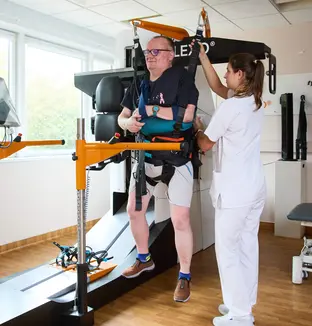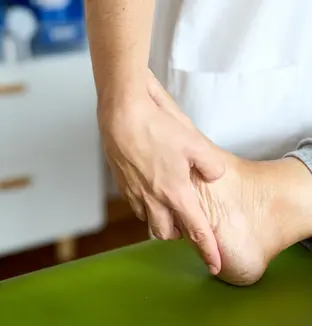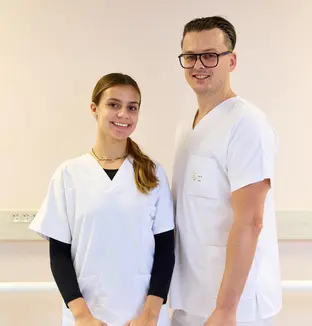Post-acute & rehabilitation, for a return to autonomy after a life accident
At emeis, our medical and care professionals and our hotel and catering teams are committed every day to caring for, rehabilitating and rehabilitating people who have been made vulnerable by surgery, acute or chronic illness, cancer or a life-threatening accident.
The many applications of rehabilitation
What is rehabilitation?
Physical and rehabilitation medicine (PRM), often referred to as re-education, functional rehabilitation or physiatry, is a medical speciality which consists of analysing the consequences of a pathology on the patient's functional capacities and proposing a treatment aimed at restoring or improving their independence in the activities of daily life, as well as their quality of life. It is therefore aimed at people suffering from a physical, cognitive or sensory disability and/or presenting a temporary or permanent handicap.
Rehabilitation involves a multidisciplinary team coordinated by a doctor specialising in PRM and including nurses, nursing aids, physiotherapists, physiotherapists, sports educators or adapted physical activity teachers, occupational therapists, speech therapists, psychologists and neuropsychologists, dieticians, orthoprosthetists, social workers, etc.
These many professions with complementary skills assess and care for patients on the basis of a personalised therapeutic plan. Many medical specialities are involved in re-education and rehabilitation programmes: orthopaedics, traumatology, rheumatology, neurology, chronic diseases, cardio-respiratory diseases and age-related pathologies.
This speciality is unique in that it caters for patients of all ages and physical conditions, with medical conditions leading to disability and co-morbidities. It concerns athletes and non-athletes alike, children and the elderly, and people with congenital or acquired disabilities.

When is rehabilitation needed?
Physical and rehabilitation medicine may be recommended in a number of situations, for example :
- Following illness or surgery
- Following an accident, trauma or amputation
- In the aftermath of a stroke or other acute neurological episode
- During the course of a chronic neurological disease (multiple sclerosis, Parkinson's disease)
- In the event of acute or chronic cardiorespiratory disease (cardiorespiratory insufficiency)
- During or after cancer treatment
- In the event of disability linked to chronic pain
- In the event of language disorders, motor delays, etc.

Discover our articles written with our experts
Everything you need to know about post-stroke rehabilitation, returning to work after long months of recovery, the superpowers of hypoxia, the role of family and friends, and even the role of diet in rehabilitation... you'll find out everything!
Post-acute and rehabilitation professions
How can we support these moments of vulnerability?
The day-to-day work of post-acute and rehabilitation professionals revolves around one priority objective: restoring patients' independence and improving their quality of life, as well as providing support and assistance in coping with frailty and disability.
Their expertise, empathy and commitment help patients through these vulnerable times.
Is rehabilitation a sector that recruits?
Massage therapist, physiotherapist, chiropodist, occupational therapist, psychomotor therapist, speech therapist, dietician… these professions are recruiting more and more and can offer great career opportunities in teamwork throughout the world.
All the professions involved in our post-acute and rehabilitation activities:
- Doctors from various specialities with expertise in rehabilitation: PRM doctors, neurologists, rheumatologists, geriatricians, cardiologists, pneumologists, oncologists and nutritionists
- Pharmacists
- Physiotherapists
- Speech therapists
- Clinical psychologists
- Neuropsychologists
- Specialist nurses
- Healthcare assistants
- Dieticians
- Occupational therapists
- Psychomotricians
- Hydrotherapists
- Sports educators, Adapted physical activity teachers
- Social workers
Our post-acute and rehab facilities
After an accident, surgery or an acute medical episode following a chronic illness, our patients need tailored, specialised and personalised care. Our clinics offer a tailor-made programme to prepare them for a return to independence and life at home.






